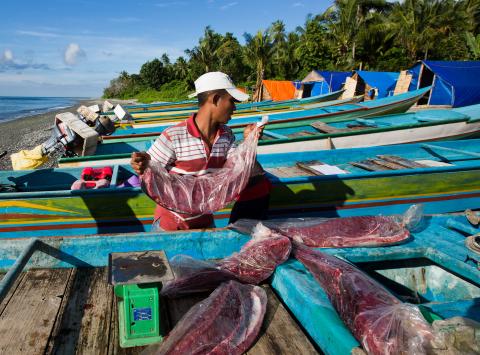How Fair Trade Makes the Supply Chain Safer

Nearly 3 million people around the globe die every year due to risk factors in the workplace, including accidents, work-related diseases and extreme working hours. The COVID-19 pandemic only served to exacerbate this situation, forcing the world to become more aware of the importance of implementing and enforcing strong occupational safety and health systems.
Establishing effective provisions to protect workers requires meaningful participation by employers, employees, public-health actors and other relevant parties. At Fair Trade USA, we consider the perspectives of all of these groups in assembling standards for creating and maintaining safe working environments that protect the health of workers.
The resulting benefits of strong workplace safety standards are profound for workers, as well as management and the business enterprise overall. For workers, safety measures can prevent injuries, illness and loss of life. At the same time, the knowledge that workers are safe in their place of employment can lead to greater peace of mind for workers and their families. For businesses, a safer work environment can lead to reduced costs, improved morale and culture, and enhanced production.
When a company’s safety standards are verified through a credible program like Fair Trade Certified, brands, retailers and traders can source their products with confidence, helping improve traceability and credibility for their business, and creating shared value for consumers who care about shopping ethically. The end game is to generate a true win-win scenario for everyone involved.
Fair Trade Certified’s Approach to Workplace Safety
How do we contribute to the establishment and enforcement of safe working conditions? Fair Trade Certified producers, groups of producers, and facilities of all sizes, including farms, fisheries and factories, are audited according to our rigorous standards for sustainability, fair wages and workplace safety. Our organization develops, implements and monitors our fair trade standards with the goals of driving income equality, community and individual well-being, empowerment, and environmental stewardship.
Our Theory of Change describes how the strategies and activities of an organization can affect the lives and livelihoods of farmers, fishers and workers in hired-labor settings over time. This model is built on four stakeholder journeys:
- Resilient Communities
- Conscious Consumers
- Mutually Beneficial Trade
- Prosperous Individuals
Our focus on helping to establish and maintain Prosperous Individuals throughout the world includes our protocols for safe working conditions. We seek to provide protections for workers, farmers and fishers by requiring secure environments, additional capital and resources, and education along their path to achieving fair trade certification
Our workplace safety standards do not solely pertain to the well-being of individuals, however. All stakeholder goals work in tandem, so that providing for the safety and health of certified producers can also lead to Resilient Communities made up of secure families who are treated equitably, Mutually Beneficial Trade sourced from ethical supply chains, and Conscious Consumers made aware of fair trade practices and understanding their value.
Setting the Standards for Workplace Safety
An important way that Fair Trade Certified drives collective empowerment is by setting industry and agricultural standards that establish groups to foster communication and collaboration on important issues such as health and safety, community investments, and working conditions. As an example, our Agricultural Production Standard (APS) requires the formation of a fair trade committee, a health and safety committee, and a social engagement team that collaborate to set, enforce and communicate guiding principles for the workplace, including:
- Ensuring that adequate first-aid supplies and access to medical services are provided in the case of workplace incidents
- Providing workers with acute medical care for all workplace injuries and illnesses, as well as lost wages during their immediate recovery time
- Maintaining machinery and equipment on the site, as well as worker transportation, and equipping them with appropriate safety devices.
- In hot climates and in hot workplaces, providing workers with suitably cool water and shade for rest breaks to protect against heat stress.
Examples of Our Safety Standards in Action Regarding Personal Well-Being:
- A major U.S. retailer sourcing its produce from Fair Trade Certified tomato farms in Mexico indicated that only 6% of workers reported accidents in the past year, while 94% said that they always felt physically safe while working.
- We surveyed more than 11,000 workers employed at factories across China, India, Mexico, Nepal and Vietnam that implemented Fair Trade Certified standards between 2016 and 2022 and learned that 90% of the respondents now feel safe working there, versus 65% in 2016.
On-Site Safety Equipment:
- Franklin Baker Co., a producer of Fair Trade Certified coconuts in the Philippines, has provided not only first-aid kits for workers, but also cash assistance to employees who tested positive for COVID-19 to take care of their medical expenses and food.
- In Peru, Fair Trade Certified coffee cooperative Asociación Provincial de Cafetaleros Solidarios San Ignacio presented workers with COVID training and bio-safety products, as well as first-aid kits.
Clean Drinking Water and Sanitary Conditions:
- The Intebaj SAPI de CV tomato growers, located in Salamanca and Santiago Valley in Guanajuato, Mexico, recognized that the bathrooms of 50 of their workers’ residential homes – housing more than 200 individuals in total – lacked basic sanitary infrastructure. A Community Development Fund project is now helping to fund construction costs for each of the bathrooms identified as needing upgrades. Making the bathrooms more hygienic will help prevent illnesses contributing to absences from work and medical expenses. It also enhances workers’ sense of health and well-being.
A Global Initiative
Fair Trade USA is proud to align its practices with the Sustainable Development Goals (SDGs) adopted by all United Nations Member States in 2015 as a universal call to action to end poverty, protect the planet, and ensure that all people enjoy peace and prosperity by 2030. While the SDGs were primarily conceived as government-level objectives, achievement of the goals and targets will require an investment from all stakeholders, including the business community.
We track our impact and measure progress against six of the 17 SDGs, with our focus on Safe Working Conditions supporting two specifically:
- SDG 6: Clean Water and Sanitation - Fair trade standards require that workers have access to potable water and adequate sanitation facilities on plantations and in factories.
- SDG 8: Decent Work and Economic Growth - Fair trade standards minimize workplace risks and ensure that appropriate measures are taken to ensure that workers and farmers are safe.








